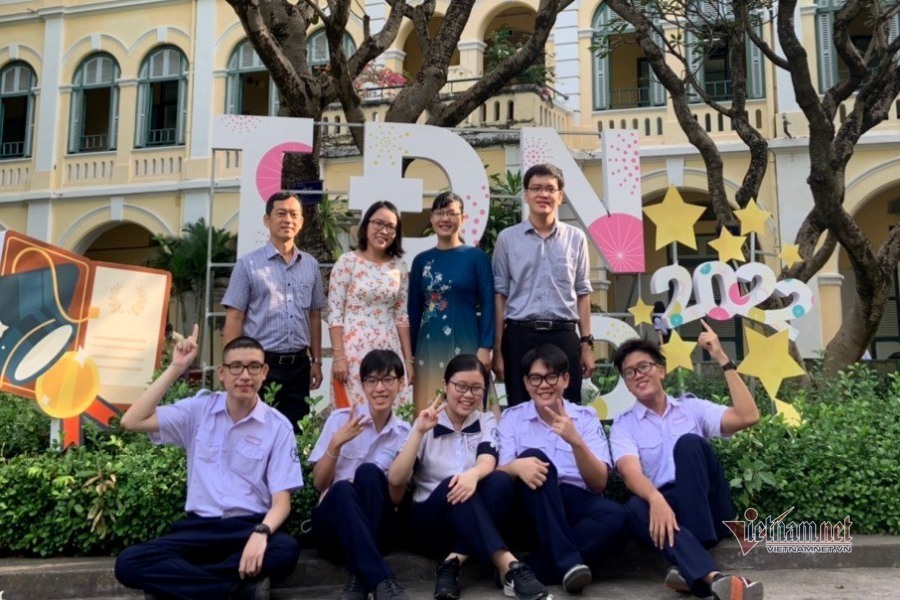Over the past four years, cleaning bathtubs and footbaths at an onsen bath has given Minh Thu the opportunity to experience Japanese culture, history, and improve her language.
Thai Minh Thu, 22 years old, is currently a final year marketing student, Ritsumeikan Asia Pacific University (APU) in Beppu city, Oita prefecture, on Kyushu island, Japan. Nearly four years here, the Saigon girl has experienced many part-time jobs, but cleaning in the onsen is the job she has been attached to the longest.
In 2018, I studied in Japan but did not know the language because the school only required IELTS scores for entrance. Her study program is also in English, so Thu was not prepared for Japanese.

Minh Thu is currently studying in the final year of Marketing at APU, Japan. Image: Characters provided
After six months of studying Japanese at school, Thu started looking for a part-time job to pay for her living expenses. By chance reading an international student recruitment news for a recording event to promote onsen online, Thu decided to participate.
That time, through an older brother who introduced this onsen area, Thu was accepted to work. Beppu is a famous onsen city in Japan. Bathhouses are found all over the city. Small local onsens do not usually recruit openly or hire foreigners. Therefore, international students are less aware of the work in these places. They mostly like to find work in restaurants, bars, supermarkets or fashion stores.
Thu’s job is to clean two bathtubs with a footbath outside, clean and arrange foot towels. Thu is equipped with a water sprayer and each time, just install the faucet, install the gun and spray water from the tub to the shower floor. Many times the machine malfunctions, cannot be opened or the faucet is torn, the female student has to use a brush to brush each brick.

The female onsen bath where Thu works in Beppu city. Image: Characters provided
After cleaning up in the bathroom, Thu moved on to sweep the changing room and spread the carpet. This bathroom opens at 11am, so all cleaning work must be done by 9:30am. Every day, Thu gets up at 7 a.m., rides a bicycle for 20 minutes to get to work. Thu works four days a week, receives a salary of 1,000 yen (more than VND 220,000) a day and enjoys a free onsen bath. I’m the only cleaner here.
In the early days of her job, Thu was embarrassed because she was not familiar with the culture of onsen bathing in public places. The biggest difficulty for me is that the water gun is heavy and difficult to control. On cold winter days, leaving the house to go to work early in the morning also discouraged Thu. When she got used to it, Thu finished the job in about 40 minutes, instead of an hour like at first.
The job was suitable for the Japanese language ability, only enough to say a few simple sentences of Thu at that time. The letter said, cleaning is not too difficult, nor does it require good Japanese or communication skills with guests. Working here for a long time, Thu has many connections with local people. Seeing her, neighbors often call her with the intimate name “onsen girl”.
Thu is also loved by the owner of the bathroom, often gives gifts and cakes and is ready to help when she asks for leave. “My uncle is the president of the city’s onsen tourism association, or organizes local events. Every time there is a program, he often takes me along,” Thu said.
Female students can participate in many workshops about the city’s history and onsen. Those experiences helped Thu improve her Japanese quickly and gain cultural knowledge. She also organized two cultural market events, with the participation of many international students in the same class, at work, attracting local people to visit and buy things.
“Those are valuable learning opportunities for me. I get to experience the culture and learn how to organize events related to onsen tourism,” Thu shared.
In addition to onsen, Thu is currently working as a kitchen assistant at a nursing home, teaching English and Vietnamese to Japanese people. Every month, Thu has an income of about 10 million dong, helping her to afford expenses.
Vietnamese international students said there are three common ways to find part-time jobs in Japan: ask for introductions from previous classmates, bring your CV to submit directly or apply through recruitment applications or websites. Mail usually applies the first two ways and is 80% effective.
However, according to Thu, before looking for a job in Japan, international students need to be psychologically ready to go to work so that when facing pressure and difficult work, they will easily overcome. In addition, you also need to equip the minimum Japanese language.
“When you are not fluent enough, you can choose to do less communication. If your Japanese is okay, and you want to challenge yourself, you can work at supermarkets, cashier counters – places that train you how to speak, help me master Japanese quickly,” said the 22-year-old female student.
After graduating in September this year, Thu plans to find a job in Marketing in Japan.
Dawn
at Blogtuan.info – Source: vnexpress.net – Read the original article here


